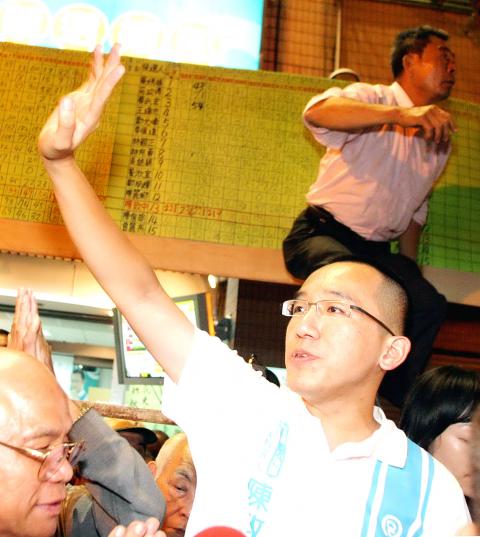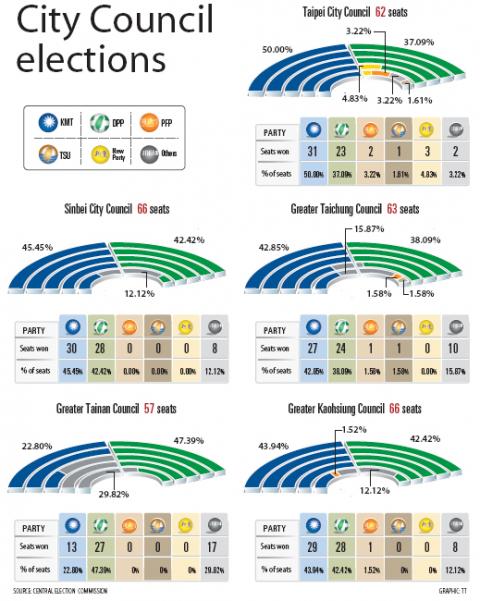Elections yesterday to select a total of 314 city councilors in Taipei, Sinbei, Taichung, Tainan and Kaohsiung ended in a tie between the Democratic Progressive Party (DPP) and the Chinese Nationalist Party (KMT), with each winning 130 seats.
Non-partisan or independent candidates garnered 45 seats in the five city councils, while the pro-unification New Party won three seats — all in Taipei City — the People First Party (PFP), another pan-blue party, won four. The pan-green, pro-independence Taiwan Solidarity Union (TSU) took two seats.
Overall, 2,642,846 ballots (35.34 percent) were cast for the DPP, while 2,889,210 (38.63 percent) were cast for the KMT.

PHOTO: CHANG CHUNG-YI, TAIPEI TIMES
The pan-green camp dominates the city council in Tainan, while the pan-blue camp controls the northern, central and southern city councils in Taipei, Sinbei City, Greater Taichung and Greater Kaohsiung.
Taipei City Council
For the Taipei City Council, the KMT remains the biggest party, while the pan-blue camp retains a majority, with 10 seats more than the pan-green camp.

GRAPHIC: TT
The KMT holds 31 of the 62 seats in Taipei City Council, while the DPP, which nominated 30 candidates, got 23 candidates elected. The New Party and PFP won three and two seats respectively, while the TSU took one seat. The final two seats in the Taipei City Council will be held by independents. The pan-green Constitution Promotion Union did not win any seats.
Green Party Taiwan convener Pan Han-sheng (潘翰聲), who ran as a candidate for Taipai’s Songshan (松山) and Xinyi (信義) districts, failed to win a seat, obtaining only 4,984 votes (2.15 percent). Green Party Taiwan stands for environmental protection and sustainability and is neither pan-green nor pan-blue.
Sinbei City Council
Of the 66 seats in the Sinbei City Council, the KMT was the biggest party with 30 seas, while the DPP came in second at 28. The rest of the eight seats were taken by independents.
Notably, city councilor candidate Chen Hung-yuan (陳鴻源) won a seat on the city council with 20,854 votes (16.65 percent), the third-highest of all eight candidates in his district, but the lowest among all KMT candidates there. Sean Lien (連勝文), former vice president Lien Chan’s (連戰) son, was shot at Chen’s rally on Friday night.
Taichung City Council
The KMT won a slight victory by taking 27 of the 63 seats in the -Taichung City Council, while the DPP took 24. The pan-blue camp holds only one more seat than the pan-green camp, while independents hold 10 seats.
Tainan City Council
The DPP won a large victory by taking 27 of the 57 Tainan City Council seats, while the KMT took 13. The other 17 seats were taken by independents.
Kaohsiung City CounciL
Of the 66 Kaohsiung City Council seats, the KMT won 29 while the DPP took 28. The pan-blue camp holds two more seats than the pan-greens, while independents occupy eight seats.
Chen Chih-chung (陳致中), former president Chen Shui-bian’s (陳水扁) son, won 32,947 votes (16.84 percent). Winning the highest -number of votes in his district, Chen Chih-chung ran as an independent candidate in 10th electoral district of Cianjhen (前鎮) and Siaogang (小港), against four candidates nominated by the DPP, four from the KMT and six others.
Cheng Hsin-chu (鄭新助), who ran as an independent candidate in Kaohsiung as a supporter of former president Chen Shui-bian, won a seat on the council with 18,283 votes (9.66 percent).
Former KMT Kaohsiung City councilor Huang Shao-ting (黃紹庭), who ran as an independent candidate, won only 10,268 votes (6.87 percent), the lowest of eight candidates in his riding, which includes Cianjin (前金), Sinsing (新興) and Lingya (苓雅) districts. Huang’s election victory in 2006 was annulled because of his holding US citizenship during his term.

CHANGING LANDSCAPE: Many of the part-time programs for educators were no longer needed, as many teachers obtain a graduate degree before joining the workforce, experts said Taiwanese universities this year canceled 86 programs, Ministry of Education data showed, with educators attributing the closures to the nation’s low birthrate as well as shifting trends. Fifty-three of the shuttered programs were part-time postgraduate degree programs, about 62 percent of the total, the most in the past five years, the data showed. National Taiwan Normal University (NTNU) discontinued the most part-time master’s programs, at 16: chemistry, life science, earth science, physics, fine arts, music, special education, health promotion and health education, educational psychology and counseling, education, design, Chinese as a second language, library and information sciences, mechatronics engineering, history, physical education

The High Prosecutors’ Office yesterday withdrew an appeal against the acquittal of a former bank manager 22 years after his death, marking Taiwan’s first instance of prosecutors rendering posthumous justice to a wrongfully convicted defendant. Chu Ching-en (諸慶恩) — formerly a manager at the Taipei branch of BNP Paribas — was in 1999 accused by Weng Mao-chung (翁茂鍾), then-president of Chia Her Industrial Co, of forging a request for a fixed deposit of US$10 million by I-Hwa Industrial Co, a subsidiary of Chia Her, which was used as collateral. Chu was ruled not guilty in the first trial, but was found guilty

Taiwan-based publisher Li Yanhe (李延賀) has been sentenced to three years in prison, fined 50,000 yuan (US$6,890) in personal assets and deprived political rights for one year for “inciting secession” in China, China's Taiwan Affairs Office spokesman Chen Binhua (陳斌華) said today. The Shanghai First Intermediate People’s Court announced the verdict on Feb. 17, Chen said. The trial was conducted lawfully, and in an open and fair manner, he said, adding that the verdict has since come into legal effect. The defendant reportedly admitted guilt and would appeal within the statutory appeal period, he said, adding that the defendant and his family have

DEADLOCK: As the commission is unable to forum a quorum to review license renewal applications, the channel operators are not at fault and can air past their license date The National Communications Commission (NCC) yesterday said that the Public Television Service (PTS) and 36 other television and radio broadcasters could continue airing, despite the commission’s inability to meet a quorum to review their license renewal applications. The licenses of PTS and the other channels are set to expire between this month and June. The National Communications Commission Organization Act (國家通訊傳播委員會組織法) stipulates that the commission must meet the mandated quorum of four to hold a valid meeting. The seven-member commission currently has only three commissioners. “We have informed the channel operators of the progress we have made in reviewing their license renewal applications, and